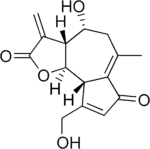Lactucin
 | |
| Names | |
|---|---|
| Preferred IUPAC name
(3aR,4S,9aS,9bR)-4-Hydroxy-9-(hydroxymethyl)-6-methyl-3-methylidene-3,3a,4,5,9a,9b-hexahydroazuleno[4,5-b]furan-2,7-dione | |
| Identifiers | |
CAS Number |
|
3D model (JSmol) |
|
| ChEBI | |
| ChemSpider | |
| KEGG | |
PubChem CID |
|
| UNII | |
CompTox Dashboard (EPA) |
|
InChI
| |
SMILES
| |
| Properties | |
Chemical formula |
C15H16O5 |
| Molar mass | 276.28 g/mol |
| Appearance | White crystalline solid |
Except where otherwise noted, data are given for materials in their standard state (at 25 °C [77 °F], 100 kPa). | |
| Infobox references | |
Lactucin is a bitter substance that forms a white crystalline solid and belongs to the group of sesquiterpene lactones. It is found in some varieties of lettuce and is an ingredient of lactucarium. It has been shown to have analgesic and sedative properties.[1] It has also shown some antimalarial effects.[2] It is also found in dandelion coffee.
See also
References
- ↑ Wesołowska A, Nikiforuk A, Michalska K, Kisiel W, Chojnacka-Wójcik E (2006). "Analgesic and Sedative Activities of Lactucin and some Lactucin-Like Guaianolides in Mice". Journal of Ethnopharmacology. 107 (2): 254–258. doi:10.1016/j.jep.2006.03.003. PMID 16621374.
- ↑ Bischoff TA, Kelley CJ, Karchesy Y, Laurantos M, Nguyen-Dinh P, Arefi AG (2004). "Antimalarial Activity of Lactucin and Lactucopicrin: Sesquiterpene Lactones Isolated from Cichorium intybus L.". Journal of Ethnopharmacology. 95 (2–3): 455–457. doi:10.1016/j.jep.2004.06.031. PMID 15507374.
- ↑ Qasem, Jamal R (2015-04-01). "Prospects of wild medicinal and industrial plants of saline habitats in the Jordan Valley". Pakistan Journal of Botany. 47 (2). ISSN 0556-3321.
This article is issued from Offline. The text is licensed under Creative Commons - Attribution - Sharealike. Additional terms may apply for the media files.